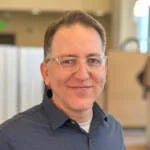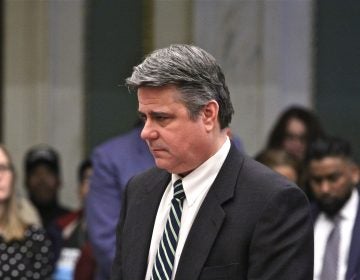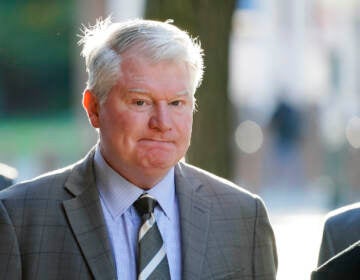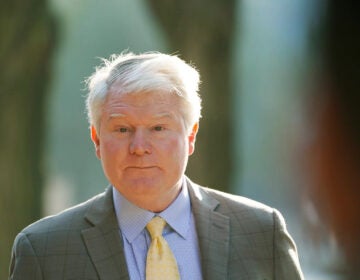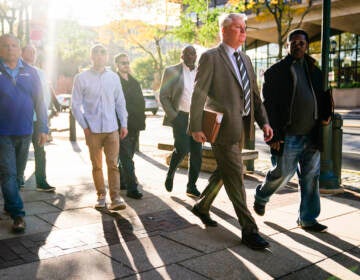Dougherty and Henon’s lawyers push for judge to dismiss charges in federal corruption case
Councilmember Bobby Henon and electricians union boss John "Johnny Doc” Dougherty are asking a federal judge to throw out all the charges in their corruption trial.

Johnny 'Doc' Dougherty walks to the federal courthouse in Philadelphia, Wednesday, Oct. 27, 2021. (AP Photo/Matt Rourke)
Councilmember Bobby Henon and electricians union boss John “Johnny Doc” Dougherty are asking a federal judge to throw out all the charges in their corruption trial and dismiss the case.
As the trial entered its fifth and possibly final week today, prosecutors had been expected to conclude their presentation of witnesses, wiretapped phone calls, and other evidence, and lawyers for the two men were expected to take their turn presenting their defense.
But in court filings Friday and arguments Monday before U.S. District Judge Jeffrey Schmehl, the defense attorneys argued that legal precedents and a lack of evidence supporting charges that Dougherty bribed Henon means they must be tossed.
Their principal claim is that since Henon has worked for Dougherty’s union, Local 98 of IBEW, for decades, the salary he received from the organization in 2015 and 2016 cannot constitute a bribe as prosecutors allege.
“You cannot bribe someone with something to which they are already entitled,” Dougherty’s attorney Terence Grugan said.
Prosecutors said Henon’s prior job as the union’s political director was converted into a lower-paid no-show position in 2012, when he took office. In return for his $70,000 Local 98 salary — which he received in addition to his council pay — he served as Dougherty’s councilmember on retainer, holding hearings and stalling legislation at the union leader’s request, they allege.
But the defense attorneys said there has never before been a bribery prosecution based on a “quid quo pro,” or favor in exchange for actions, that was already in place before the corruption occurred.
Prosecutors have not presented any document, wiretapped phone call, or other evidence from 2015 in which Henon and Dougherty agreed to start trading bribes for official actions, they said.
“We’ve never seen a case like this,” Henon’s attorney Brian McMonagle said. “He was entitled to these benefits.”
Schmehl expressed some skepticism of the defense arguments, saying, “It’s not in every case that they have an explicit agreement.” Assistant U.S. Attorney Frank Costello said investigators often uncover political corruption after it started and it does not matter how or when Henon and Dougherty agreed to their deal.
While not explicitly stated, the pact “is reflected in Henon’s agreement” to take actions on the union leader’s behalf, as shown by the evidence in the case, Costello said.
Citing political corruption trials including the prosecutions of former Virginia Governor Robert F. McDonnell in 2016 and former New York State Assembly Speaker Sheldon Silver in 2015, the defense attorneys also argued that the Supreme Court’s narrowed definition of “official acts” exclude the actions Henon performed for Dougherty, such as arranging for him to meet with Comcast executives.
A unanimous Supreme Court vacated McDonnell’s conviction and ruled that merely setting up a meeting, calling another public official, or hosting an event does not constitute an official act for the purpose of proving corruption. The ruling led to the reversal of several prominent convictions and the dismissal of some cases in the succeeding years.
“A meeting’s a meeting,” Grugan said. “The language is pretty explicit.”
In December 2015, as Comcast was negotiating the renewal of its cable franchise agreement with the city, Henon arranged two meetings between Dougherty and the executives.
During one encounter in his council office, Henon allegedly watched quietly as Dougherty threatened to use his influence to block the franchise renewal unless Comcast hired more unionized electrical contractors. At a second meeting at a hotel near City Hall, Dougherty made a last-minute deal with the company that allowed the renewal vote to go ahead, according to witness testimony.
When Schmehl asked Costello how arranging Dougherty’s discussions with Comcast could constitute an official act by Henon, the attorney argued that Dougherty’s threat made the first meeting into something more substantive. He also noted the councilmember recessed a council hearing to make time for the second encounter.
Henon allowed Dougherty “to basically take his place in the negotiations,” Costello said. “This was part and parcel of the negotiations. This wasn’t a ‘meeting.’”
Dueling interpretations
Grugan also took issue with charges stemming from Dougherty’s requests that Henon ask the Department of Licenses & Inspections to halt the installation of two MRI machines at Children’s Hospital of Philadelphia by non-union contractors.
For the first installation there is no evidence that Henon himself spoke with L&I chief Carlton Williams, while for the second Henon only provided Williams with information, which does not constitute an “official act” under the Supreme Court’s standard, Grugan said.
But Assistant U.S. Attorney Richard Barrett pointed to an earlier meeting on another matter in which Dougherty threatened to have Williams fired, and said that in phoning the L&I head about the MRI machines, Henon was helping Dougherty pressure Williams.
On another occasion, Dougherty advised Henon to put heat on the plumbers union by threatening to hold a hearing on updating the plumbing code. But the hearing was never scheduled or held, making the charge “nonsensical,” Grugan said. Henon likewise told Dougherty he would hold a hearing on a towing company that towed Dougherty’s car but never followed through.
Costello responded that agreeing to do an official act, such as introducing the plumbing legislation, is enough to constitute a bribe. “The fact that it’s never actually introduced is not material to that charge,” he said.
The attorneys also traded arguments over the allegation that Joseph Ashdale, head of the glaziers (windows installers) union, bribed Henon with windows installed in the home of Courtney Voss, Henon’s chief of staff with whom he was in a relationship at the time.
Ashdale was board chair of the Philadelphia Parking Authority at the time and wanted Henon to block a proposed audit of the agency. Ashdale has not been charged.
In the wiretapped call in which Henon was first told about the audit proposal, he immediately said he would vote against it, McMonagle pointed out. The councilmember only discussed the window job with Ashdale later, and told him that the homeowners “intend to pay for it” and “don’t want anything for free.”
In addition, while Ashdale asked Henon to vote down the council request for an audit, Henon instead supported a council move to table the measure, the lawyer said.
Barrett countered with a different interpretation of the events, which he said jurors might find convincing and should be allowed to evaluate.
When Henon initially mentioned the window job to Ashdale, he knew to be careful and “feel out the situation,” Barrett said. He made a point of not identifying Voss as the homeowner and of saying the windows should not be given for free, the attorney said.
“He doesn’t know how Mr. Ashdale is going to react, so he doesn’t give him all the information. He puts it on the agenda… to see how Mr. Ashdale will respond,” Barrett said. “It’s the evolution of the thing of value and what Mr. Ashdale is ultimately going to do for Mr. Henon.”
Paraphrasing Supreme Court Justice Anthony Kennedy’s concurrence in a 1992 public corruption case, Barrett said public officials “sometimes use ‘winks and nods’ or certain words cast in certain ways to seal the deal.”
After Ashdale eventually learned that the windows were for Voss he offered to cover the cost of the window glass. At that moment, he was agreeing to give Henon a bribe in exchange for his help quashing the PPA audit, Barrett argued. And while the audit measure was initially tabled, a few months later Henon (along with most of the other councilmembers) did vote it down as Ashdale requested.
Schmehl did not say when he will rule on the defense requests for the charges to be thrown out, but he has said he expects the trial to resume Tuesday afternoon, after a break to allow jurors to vote in local and state elections.
The trial is taking place two years after prosecutors brought a sprawling 116-count indictment against Henon, Dougherty, and several people with ties to Local 98. The charges have been split into two trials, with the current case focusing on the bribery charges against Henon and Dougherty. It is expected to last about one more week.
Disclosure: The Electricians Union Local 98 represents engineers, camera personnel, editors, audio and maintenance techs at WHYY.

Subscribe to PlanPhilly
WHYY is your source for fact-based, in-depth journalism and information. As a nonprofit organization, we rely on financial support from readers like you. Please give today.



